There are many things to admire about parenthood, one of them being a mother’s courage to accept the changes that her new child will bring to her body. It’s not just about weight and dietary changes too. Carrying a child will bring about various conditions and restrictions to an expecting mother’s body, and she has to handle all of this with the hopes that her child will come out with the least complications possible.
With The Medical City‘s help, Familywise Asia brings you a few lists to help with your pregnancy questions. Although the information below are basic guidelines to pregnancy, we realize that there’s no singular guidebook to parenthood, and that goes for pregnancy as well. Every mother has to listen to her body and consult with her physician, so don’t forget to ask your doctor if you have any additional restrictions and if you have any other conditions to watch out for.
Food to Avoid
Soft Cheeses (ex. Brie & Camembert)
- Can possibly contain bacteria that can harm the baby
More than 3mg/d of Coffee
- Don’t drink caffeine excessively. Having a cup or 2 of coffee should pose no problem.
Fish – high in mercury content (ex. Shark, Swordfish, King Mackerel, Tile Fish)
- “If mercury content of locally caught fish is unknown, then overall fish consumption should be limited to 6 ounces per week.”
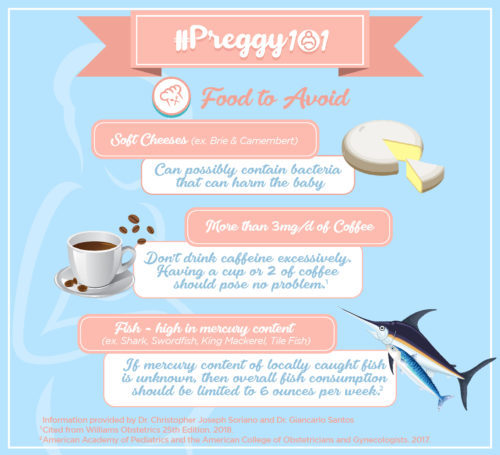
Listeria Monocytogenes (ex. Raw Vegetables, Coleslaw, Apple Cider, etc.)
- This bacteria is an uncommon but probably underdiagnosed cause of neonatal sepsis (an infection in newborn children).
Carbonated Drinks and Dairy
-
-
- These may build up acid in the stomach and cause heartburn.
-
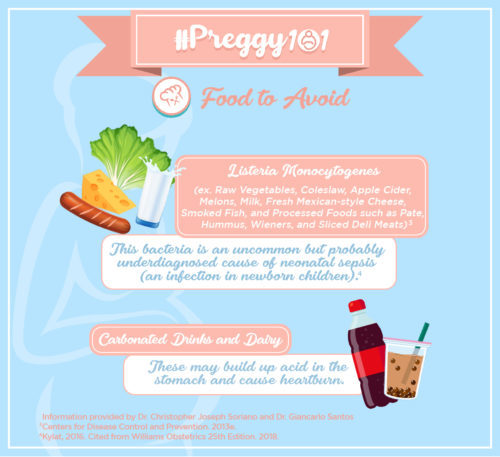
Body Changes
General Body
-
- Darkening
- Due to hormone production
- Underarms
- Areolae
- Linea Nigra (the vertical line under the belly button)
- Genital Skin
- Due to hormone production
- Edema on the Feet (Namamanas)
- Weight Gain (3rd Trimester)
- Belly will normally grow larger after the 5th month
- Increase in Cervical Mucus
- This contains a significant amount of immunoglobulins to protect the fetus from infections that may come from the vagina
- Heartburn
- Hemorrhoids
- This will resolve subsequently after delivery
- Pregnant women should eat food rich in fiber in order to prevent constipation
- Darkening
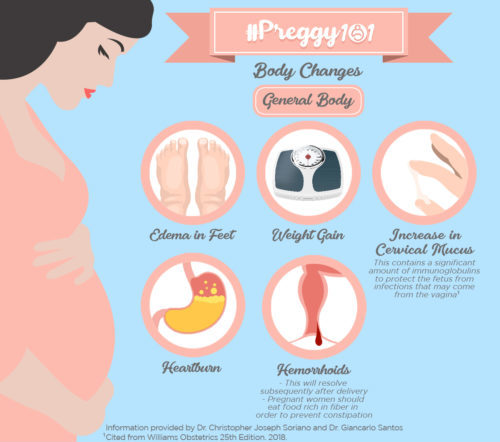
Breast
-
-
- In early pregnancy, breast tenderness, pain, and paresthesias (feeling of pins and needles) are not uncommon.
- On the second month, the breasts grow larger and veins become more visible.
- After a few months, colostrum (a thick, yellowish fluid that the mammary glands produce prior to breastfeeding) can be observed.
- The areolae (the circular part edges of the nipple) will become broader and more darkly pigmented.
-
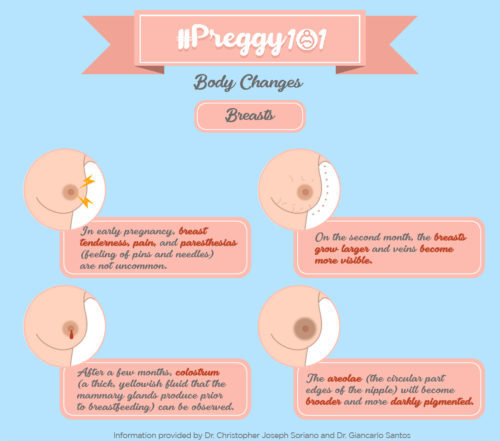
Vagina
- Natural Changes
- Spotting (First Trimester)
- An episode of spotting should not be alarming to the mother
- Also called implantation bleeding, this happens when blood is released when the fertilized egg implants into the endometrium.
- Spotting (First Trimester)
-
- White Menses
- White vaginal discharge generally increase as the pregnancy progresses
- This is more pronounced during the 3rd Trimester
- White Menses
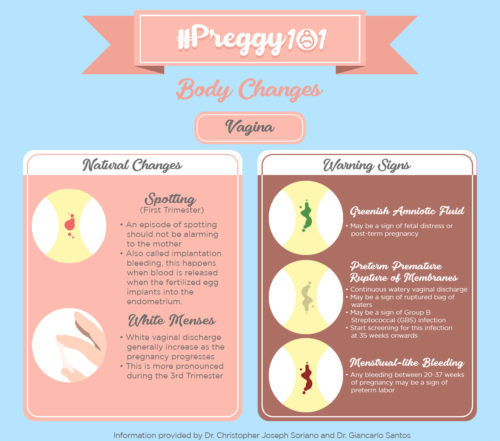
- Warning Signs
- Greenish Amniotic Fluid
- May be a sign of fetal distress or post-term pregnancy
- Preterm Premature Rupture of Membranes
- Continuous watery vaginal discharge
- May be a sign of ruptured bag of waters
- May be a sign of Group B Streptococcal (GBS) infection
- Start screening for this infection at 35 weeks onwards
- Menstrual-like Bleeding
- Any bleeding between 20-37 weeks of pregnancy may be a sign of preterm labor
- Greenish Amniotic Fluid
*The following information was provided by Dr. Christopher Joseph Soriano and Dr. Giancarlo Santos from The Medical City.

Patricia Li is a frequent contributor to Familywise Asia and Workwise Asia. She loves to read and write, and tries to incorporate this in her career.

